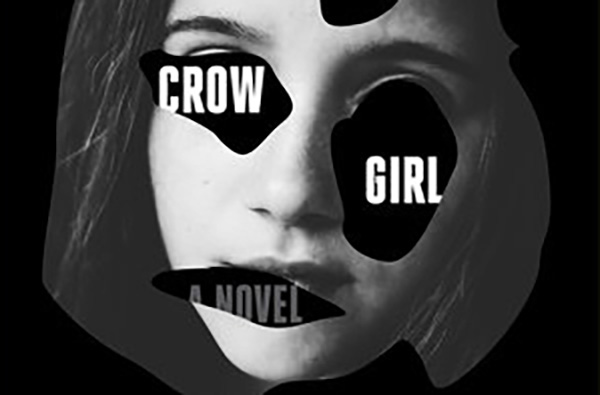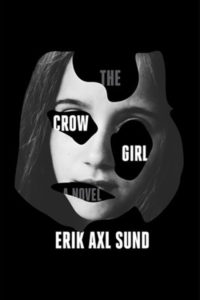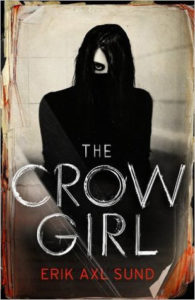Home »

Seamless collaboration produces a dark novel
Book Review
By Derryll White
 Sund, Erik Axl (2016). The Crow Girl.
Sund, Erik Axl (2016). The Crow Girl.
Realizing you like someone can take a matter of minutes, but getting to know them can take years. -Jeanette Kihlberg
Erik Axl Sund is a pseudonym for a new writing pair – Swedish authors Jerker Eriksson and Håkan Axlander Sundquist. The translator, Neil Smith, is equally new to me but his work makes the collaboration even more seamless.
I was brought to Scandinavian writing through the efforts of Stieg Larsson in the Millennium series and then Henning Mankell with his Inspector Wallander books. Then the darker worlds of Ake Edwardson, Karin Fossum, Arnaldur Indridason and Anne Holt opened up. None of them are as disturbing as this work.
This is a dark novel, bleak in its exploitation of child sexual abuse. The authors look hard at the privileges white middle class fathers take, the fact that they assume access to all things including their daughters. I am the father of two daughters and this novel has brought me great sadness in part.
As parents we learn from an early age that what we do, how we respond to each situation, imprints on our children. In part we intimately know this from realizing what has imprinted on us as children. So, to my mind there is absolutely no excuse for child sexual abuse.
Having said that, the combined insights of Erik Axl Sund take the reader through the devastating consequences of such acts. Things such as identity fragmentation and dissociative identity disorder. Swedes are worrying about the dissolution of their liberal democracy while the tortured body of a young boy is discovered. Descriptions of sexual mutilation abound. Psychotherapist Sofia Zetterlund brings into the account the dissociative actions of several of her patients.
This is not a work that takes forward the impacts of Scandinavian noir mystery writers on today’s literary world.
********
How much can a human being withstand before they break and turn into a monster?
-Sofia Zetterlund
Excerpts from the novel:
 GOD – “I believe in a divine truth. A God who exists beyond our understanding. A God who was close to man at the beginning of time, but whose voice within us has faded away over the centuries. The more God has become institutionalized by human interventions like churches and the priesthood, the less remains of what was there at the start.”
GOD – “I believe in a divine truth. A God who exists beyond our understanding. A God who was close to man at the beginning of time, but whose voice within us has faded away over the centuries. The more God has become institutionalized by human interventions like churches and the priesthood, the less remains of what was there at the start.”
PARTNERS – “To feel secure you also have to feel that someone understands you.” Sofia took a sip of wine. “But that’s a fundamental failing in most human relationships. People forget to pay attention to each other, to appreciate what the other person does, because the only path that seems worth following is your own path. I blame individualism. It’s become a sort of religion. It’s actually damn weird that people despise security and loyalty in a world so full of war and suffering. It’s one hell of a paradox!”
MEMORY – Experiences are essential for memory. Things happen, are absorbed, and become memories, but over time the process flattens out and forms a single whole. Several events become one. She feels that her life is a big lump, where the abuse and assaults have become one single event that in turn becomes an experience, that in turn becomes a realization.
SEXUAL ABUSE – Once upon a time there was a little girl called Victoria, and when she was three her dad built a room inside her. A deserted room where there was only pain and suffering. Over the years it became a room with sturdy walls made of sorrow, with a floor made of the desire for revenge, and, lastly, a solid roof of hate.
MURDER – Murder, she thought, as the steering wheel juddered, is a woman killed in her own home by her jealous husband after she tells him she wants a divorce.
MEMORY – No memory is unimportant for the brain, she thinks. On the contrary, it’s often the most trivial memories that are dominant, whereas you suppress the things you ought to remember. The brain doesn’t trust itself, doesn’t trust its ability to handle difficult things, so it would rather remember where you parked the car than the fact you were repeatedly raped by your dad.
LOST – She wonders about letting the waves carry her out, off to unlimited freedom, away from everything. She feels sleepy, but deep down she realized long ago that she can never sleep deeply enough. To get away. Her head is like a lamp that has been left on in a silent, dark house. There are always moths fluttering around the naked electric light, their dry wings in her eyes.
“That reminds me of the quote ‘There are many ways to cry: noisily, quietly, or not at all’.” -Jeanette Kihlberg
 – Derryll White once wrote books but now chooses to read and write about them. When not reading he writes history for the web at www.basininstitute.org.
– Derryll White once wrote books but now chooses to read and write about them. When not reading he writes history for the web at www.basininstitute.org.







